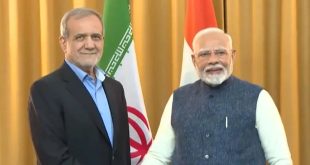 Rajnath Singh in IPAC: Navigating Tensions Amid Google’s Geopolitical Chessboard
Rajnath Singh in IPAC: Navigating Tensions Amid Google’s Geopolitical Chessboard
In the ever-evolving landscape of international diplomacy, where countries are like chess pieces on a geopolitical chessboard, it’s not unusual for tensions to rise and fall like waves on the sea. In recent times, the relationship between India, Canada, and the United States has been no exception to this rule. India’s Defense Minister, Rajnath Singh, recently made some intriguing statements during the 13th Indo-Pacific Army Chiefs Conference (IPAC) in Delhi. Let’s delve into the intricacies of this diplomatic affair and explore the implications it carries.
The Complexities of Indo-Pacific Security
Rajnath Singh kicked off his speech at IPAC by acknowledging the undeniable complexity of security challenges in the Indo-Pacific region. It’s a region characterized by a multitude of issues that demand a delicate balancing act on the part of nations involved. Among the prominent challenges are territorial disputes and piracy, both of which pose significant threats to regional stability.
In addition to these immediate concerns, Singh pointed out the environmental issues plaguing some of the smaller nations in the region due to climate change. These problems are often overshadowed by larger geopolitical events but can have profound consequences for the countries affected. Therefore, it’s crucial for global powers to consider the well-being of smaller nations in their policies.
Understanding the Significance of the Indo-Pacific Region
The Indo-Pacific region isn’t just about maritime trade; it’s a multifaceted arena that encompasses political, security, and strategic dimensions. With nearly 40 countries and their economies in play, the region boasts a population of around 65% of the world’s total. This demographic weight translates into a significant contribution to global GDP, accounting for about 63%.
Furthermore, the Indo-Pacific region plays a pivotal role in merchandise trade, with approximately 46% of global trade originating here. Additionally, it accounts for 50% of the world’s maritime trade. These statistics underscore the region’s profound significance on the world stage.
Eric Garcetti’s Perspective
Amidst tensions, Eric Garcetti, the U.S. Ambassador to India, emphasized the importance of maintaining strong relations with both India and Canada. He stressed that all parties involved must ensure that no country’s dominance, security, or relationships take on a negative connotation. In essence, Garcetti expressed the desire to elevate and strengthen the existing relationships between the nations.
He noted that the ties between India and the United States are particularly robust, fostering cooperation on multiple fronts. The challenge, according to Garcetti, is to find solutions to contentious issues that don’t jeopardize the overall bond.
Addressing the Khalistani Threat
It’s worth mentioning that amid these diplomatic discussions, the issue of Khalistani terrorism came to the fore. Hardeep Singh Nijjar, an alleged Khalistani terrorist accused in murder cases, had previously taken refuge in Canada. This had raised concerns, with India pressing Canada for action against individuals linked to terrorist activities.
Canadian Prime Minister Justin Trudeau had previously raised the issue in the House of Commons, acknowledging the presence of such elements in his country. The Canadian government had even issued deportation orders for one Indian diplomat.
In conclusion, the diplomatic nuances between India, Canada, and the United States are a testament to the ever-changing dynamics of international relations. Rajnath Singh’s statements at IPAC shed light on the region’s challenges, emphasizing the need for cooperation and careful navigation. It remains to be seen how these nations will handle the complex web of issues, but one thing is certain: the Indo-Pacific region will continue to be a focal point in global affairs
 Suspense Crime Sach Ka Dam
Suspense Crime Sach Ka Dam


